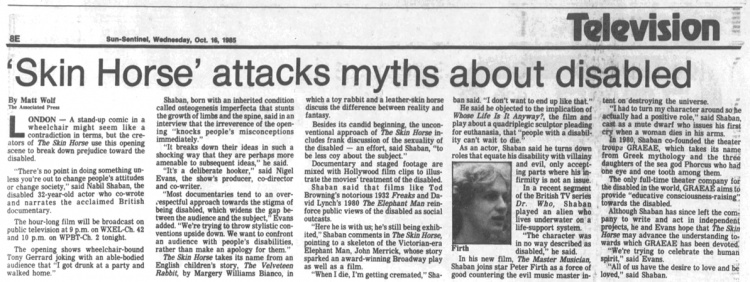Skin Horse Attacks Myths About Disabled
- Publication: Sun-Sentinel
- Date: 1985-10-16
- Author: Matt Wolf
- Page: 8E
- Language: English
A stand-up comic in a wheelchair might seem like a contradiction in terms, but the creators of The Skin Horse use this opening scene to break down prejudice toward the disabled.
"There's no point in doing something unless you're out to change people's attitudes or change society," said Nabil Shaban, the disabled 32-year-old actor who co-wrote and narrates the acclaimed British documentary.
The hour-long film will be broadcast on public television at 9 p.m. on WXEL-Ch. 42 and 10 p.m. on WPBT-Ch. 2 tonight.
The opening shows wheelchair-bound Tony Gerrard joking with an able-bodied audience that "I got drunk at a party and walked home."
Shaban, born with an inherited condition called osteogenesis imperfecta that stunts the growth of limbs and the spine, said in an interview that the irreverence of the opening "knocks people's misconceptions immediately."
"It breaks down their ideas in such a shocking way that they are perhaps more amenable to subsequent ideas," he said.
"It's a deliberate hooker," said Nigel Evans, the show's producer, codirector and co-writer.
"Most documentaries tend to an over-respectful approach towards the stigma of being disabled, which widens the gap between the audience and the subject," Evans added. "We're trying to throw stylistic conventions upside down. We want to confront an audience with people's disabilities, rather than make an apology for them."
The Skin Horse takes its name from an English children's story, The Velveteen Rabbit, by Margery Williams Bianco, in which a toy rabbit and a leather-skin horse discuss the difference between reality and fantasy.
Besides its candid beginning, the unconventional approach of The Skin Horse includes frank discussion of the sexuality of the disabled -- an effort, said Shaban, "to be less coy about the subject."
Documentary and staged footage are mixed with Hollywood film clips to illustrate the movies' treatment of the disabled.
Shaban said that films like Tod Browning's notorious 1932 Freaks and David Lynch's 1980 The Elephant Man reinforce public views of the disabled as social outcasts.
"Here he is with us; he's still being exhibited," Shaban comments in The Skin Horse, pointing to a skeleton of the Victorian-era Elephant Man, John Merrick, whose story sparked an award-winning Broadway play as well as a film.
"When I die, I'm getting cremated," Shaban said. "I don't want to end up like that."
He said he objected to the implication of Whose Life Is It Anyway?, the film and play about a quadriplegic sculptor pleading for euthanasia, that "people with a disability can't wait to die."
As an actor, Shaban said he turns down roles that equate his disability with villainy and evil, only accepting parts where his infirmity is not an issue.
In a recent segment of the British TV series Dr. Who, Shaban played an alien who lives underwater on a life-support system.
"The character was in no way described as disabled," he said.
In his new film, The Master Musician, Shaban joins star Peter Firth as a force of good countering the evil music master intent on destroying the universe.
"I had to turn my character around so he actually had a positive role," said Shaban, cast as a mute dwarf who issues his first cry when a woman dies in his arms.
In 1980, Shaban co-founded the theater troupe GRAEAE, which takes its name from Greek mythology and the three daughters of the sea god Phorcus who had one eye and one tooth among them.
The only full-time theater company for the disabled in the world, GRAEAE aims to provide "educative consciousness-raising" towards the disabled.
Although Shaban has since left the company to write and act in independent projects, he and Evans hope that The Skin Horse may advance the understanding towards which GRAEAE has been devoted.
"We're trying to celebrate the human spirit," said Evans.
"All of us have the desire to love and be loved," said Shaban.
Disclaimer: These citations are created on-the-fly using primitive parsing techniques. You should double-check all citations. Send feedback to whovian@cuttingsarchive.org
- APA 6th ed.: Wolf, Matt (1985-10-16). Skin Horse Attacks Myths About Disabled. Sun-Sentinel p. 8E.
- MLA 7th ed.: Wolf, Matt. "Skin Horse Attacks Myths About Disabled." Sun-Sentinel [add city] 1985-10-16, 8E. Print.
- Chicago 15th ed.: Wolf, Matt. "Skin Horse Attacks Myths About Disabled." Sun-Sentinel, edition, sec., 1985-10-16
- Turabian: Wolf, Matt. "Skin Horse Attacks Myths About Disabled." Sun-Sentinel, 1985-10-16, section, 8E edition.
- Wikipedia (this article): <ref>{{cite news| title=Skin Horse Attacks Myths About Disabled | url=http://cuttingsarchive.org/index.php/Skin_Horse_Attacks_Myths_About_Disabled | work=Sun-Sentinel | pages=8E | date=1985-10-16 | via=Doctor Who Cuttings Archive | accessdate=27 December 2025 }}</ref>
- Wikipedia (this page): <ref>{{cite web | title=Skin Horse Attacks Myths About Disabled | url=http://cuttingsarchive.org/index.php/Skin_Horse_Attacks_Myths_About_Disabled | work=Doctor Who Cuttings Archive | accessdate=27 December 2025}}</ref>
